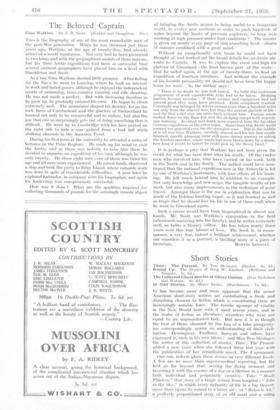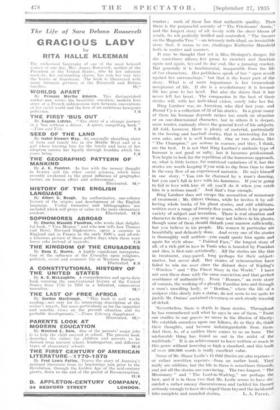Short Stories
IT has become more and more apparent that the newer American short-story writers are contributing a fresh and disturbing element to fiction which is constituting them an
iI increasingly notable force. The terrific upsurge of vitality in the New World bore with it until recent years, and in the realm of fiction as elsewhere, recorders who were not equal to an unprecedented task. But now it is as though the best of them, cleansed by the loss of a false prosperity, are correspondingly nearer an understanding of their civil- isation. Hemingway, Faulkner, Saroyan and others have expressed it, each in his own idiom ; and Miss Tess Slesinger,
the writer of this collection of stories, Time : The Present, added a new voice when she followed them last year with the publication of her remarkable novel, The Einpossessed.
• One can, indeed, place these stories on very different levels.
A few are no more than super-excellent reporting, but the best go far beyond that, seizing the flying moment and investing it with the essence of a day or a lifetime in a manner both individual and poignantly creative. Take " MissiS Flinders," that story of a tragic return from hospital ; " Jobs in the Sky," in which every indignity of life in a big Departt. ment Store opens its wound to a bitter air ; or " Relax is a perfectly proportioned story of an old maid and a ridinii master ; 'each of these has that authentic quality. Then there is the purposeful serenity of " The Friedmans' Annie," and the longest story of all, lovely with the sheer bloom of youth, its wit perfectly bridled and controlled, " The Answer on the Magnolia Tree "—an intensely individual, an irresistible story that, it seems to me, challenges Katherine Mansfield both in matter and manner.
It may be thought that wit is _Miss Slesinger's danger, fcit• She sometimes .allows: .lier prose to ricochet and function again and again, beyond its due end, like a jumping crackeci But generally it is fundaMental, inseparable from the life of her characters. Iler, Publishers speak of her -" open revo't against her surroundings," but that is the lesser part of the story. ,What is of more importance is her tremendotiii acceptance of life. If she is a revolutionary it is because life has gone to her head. .But also she shows that it has never left her heart. The Compassion in the best of these stories Will, with her individual vision, surely take her fai: Ring Lardner was an American who died last year, and Round Up is a collection of 35 of his stories. In a great many of them his 'humour depends rather too much on situation or on one-dimensional character, but in others it is deeper, more tender, curiously above the general level of his subjects. All told, however, there is plenty of material, .particularly in the boxing and baseball stories, that is interesting for its own sake, and it is well handled. One or two stories, like " The Champion," are serious in essence, and they, I think, are the best. It is not that Ring Lardner's sardonic type of humour is not good or salty, but it becomes professional. You begin to look for the repetition of the humorous approach, or, what is little better, for contrived variations of it, but the stories are worth keeping if you wish to dip from time to time in the easy flow of -an experienced narrator. tie says himself in one story, " You can be charmed by a man's dancing, but you can't fall in love with his 'funniness. If you're going to fall in love with him at all, you'll do it when you catch him in a serious mood." And that's true enough. Ring.Lardner does not escape the accusation of monotony of treatment ; Mr. Oliver Onions; while he invites it by cot- lecting whole books of his ghost stories, and odd additions, written over a range of twenty-five years, rebuts it by genuine variety of subject and invention. There is real situation and character in-them ; you may or may not believe in his ghosts, though some of them should disturb your marrow .sulticiently, but you believe in his people. His women in particular are beautifully and delicately done. And every one of the stories is thoroughly well written—you could quote him again and again for style alone. " Painted Face," the longest story of all, of a rich girl in love in Tunis who is branded by Poseidon and dies, is first-rate artistically. All the stories are like this in treatment, easy-paced, long perhaps for their subject6 matter, but never dull. But stories of reincarnation have failed to win me over since the distant days of Kipling'S " Wireless " and " The Finest Story in the World." I have net seen them done with the same conviction and that perfect semblance of authenticity. Even " Roourn," an eerie story of osmosis,.,the working of a ghostly Familiar into and through a man's unwilling body, or " lienlian," where the life of a sculptor ebbs slowly into a statue, do not seem to me quite to justify Mr. Onions' sustained cleverness or such steady massing of detail.
'Nevertheless, there is depth in these stories. Throughout . he has remembered well what he says in one of them, " FrOni otir cradles to our graves we rnoVe in the illusion Of liberty.' We establish ourselves upon our fellows, do as they do; think their thoughts, and become indistinguishable from them: And then, lo, of a sudden there comes to us an hour. The unsharable thing has found us out in the midst of the multitude." It is an achievement to have written so much in this genre without lowering so high a standard, and this book of over 200,000" words is really excellent value.
Some of Mr. Shane Leslie's 15 Odd Stoiies are also reprints:—. or rather rewritten reprints—from an earlier book. They really are oddities, but the life in them is sometimes thinnish, and not all the stories are convincing. The two longest, " The Missionary " and " The Lord-in-Waiting," are perhaps tlior best, and it is in these two that Mr. Leslie seems to have dis- carded a rather uneasy discursiveness and tackled his themes seriously enough to have developed them beyond the incidental















































 Previous page
Previous page